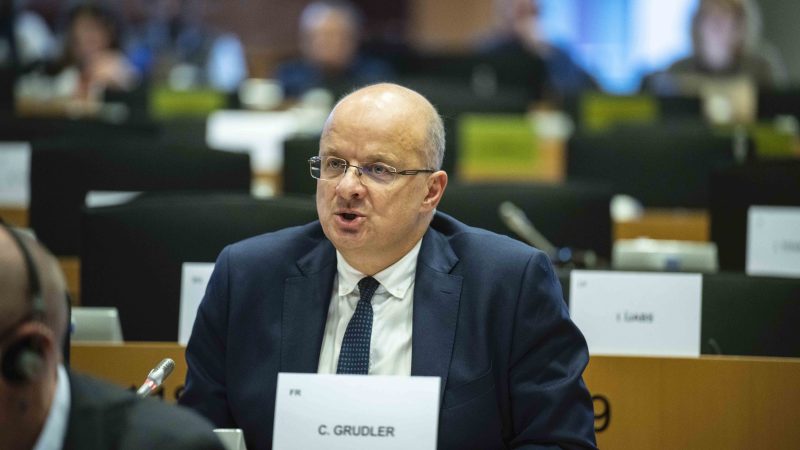Members of European Parliament, led by French centrist MEP Christophe Grudler, are preparing to challenge the Parliament’s stance on EU electricity market reform, with a formal “objection” due to be presented next Tuesday (12 September).
The European Commission tabled proposals in March to reform the bloc’s electricity market to counter soaring electricity prices that hit consumers after Russia invaded Ukraine.
While EU member states are still debating the proposal in the Council, the European Parliament already adopted its position during a vote in the industry committee on 19 July, based on a report by Socialist MEP Nicolas González Casares.
A second vote on the same day gave Parliament a mandate to send Casares’ report directly to the Council to swiftly complete the reform during final “trilogue” talks involving the European Commission.
But pro-nuclear lawmakers were left frustrated with the Casares report, which restricted financing options for the construction of new reactors and the lifetime extension of existing ones.
The fast-track procedure also meant that a plenary vote by the full Parliament was no longer necessary – unless a sufficient number of lawmakers raised an “objection” against it.
This is precisely what pro-nuclear MEPs, led by Grudler, are now set on doing.
Backing from 72 MEPs needed
Next Monday (11 September), EU Parliament President Roberta Metsola will announce the current parliamentary mandate for the reform negotiations at the plenary session, based directly on the report voted in committee on 19 July.
However, this procedure can be challenged if 72 signatures are collected by noon the following day (12 September). If successful, all MEPs can vote on whether to support the Parliament’s mandate in a plenary session on Wednesday (14 September).
Speaking to EURACTIV France, Grudler defended the move. “This not about questioning the position of the European Parliament, but of ensuring that it suits all the MEPs”, he told us.
Triggering the procedure is not insignificant: by opposing the Parliament’s mandate, Grudler said he wanted to make a point and “show that there is no unanimous mandate from the European Parliament on the report voted on in the industry committee”.
In defence of nuclear
The MEPs joining Grudler’s “objection” say they want more financing options for existing nuclear plants under the EU’s reformed electricity market.
“The Parliament’s current position has gutted the European Commission’s proposal, which would have allowed existing nuclear plants to be financed through subsidy mechanisms currently being negotiated as part of the reform,” explains Grudler.
In its proposal, the Commission said “all public support for new investments” in renewables or nuclear plants “will have to be in the form of two-way Contracts for Difference (CfDs)”.
The proposal applied to “investments in new power-generating facilities,” including those “aimed at repowering existing power-generating facilities,” including nuclear, without specifying any restrictions on how this should be done.
However, the Casares report is more restrictive, saying CfDs should be “strictly limited to the share of total electricity generation capacity that reflects the cost of the new investment”.
Quite the disappointment for Grudler, who believes that “this creates a gap in the financing of existing nuclear power, which is essential if we are to avoid a blackout at least between 2025 and 2030 before any new nuclear plants come on stream”.
Little chance of success
Grudler has already collected around 50 of the 72 signatures needed to object to the Parliament’s current negotiating mandate.
The objection will then need backing by a simple majority of MEPs to trigger a vote on the text during the Parliament’s next plenary session, with the possibility of tabling amendments.
However, it is far from certain that the objection itself will gain enough support, especially as the July vote in the Parliament’s ITRE committee saw over 80% of MEPs in favour of the mandate set out in Casares’ report.
What’s more, the MEPs most opposed to the text in committee belong to minority political factions, including the far-right ID group, the nationalist ECR, the radical Left group, as well as French MEPs from the centre-right EPP and Grudler’s own centrist group Renew.
The objection, therefore, has little chance of being adopted.
Still, pro-nuclear MEPs will have highlighted the Parliament’s nuclear divisions, which Paris might want to use during the final trilogue talks on EU electricity market reform.



@qyron @Emil
To qualify that »none(*)«:
- Nuclear power /is/ sustainable, but I guess you don’t mean that
- Physical resources demand (i. e. material) is significantly lower for nuclear power than for e. g. solar or wind plus storage
- Solar and wind often have no output; then you need to get 100% of live demand from other sources, such as storage or backup plants. Batteries don’t exist at that scale at all (there is some hope that they might get there in 10 to 20 years, but still R&D).